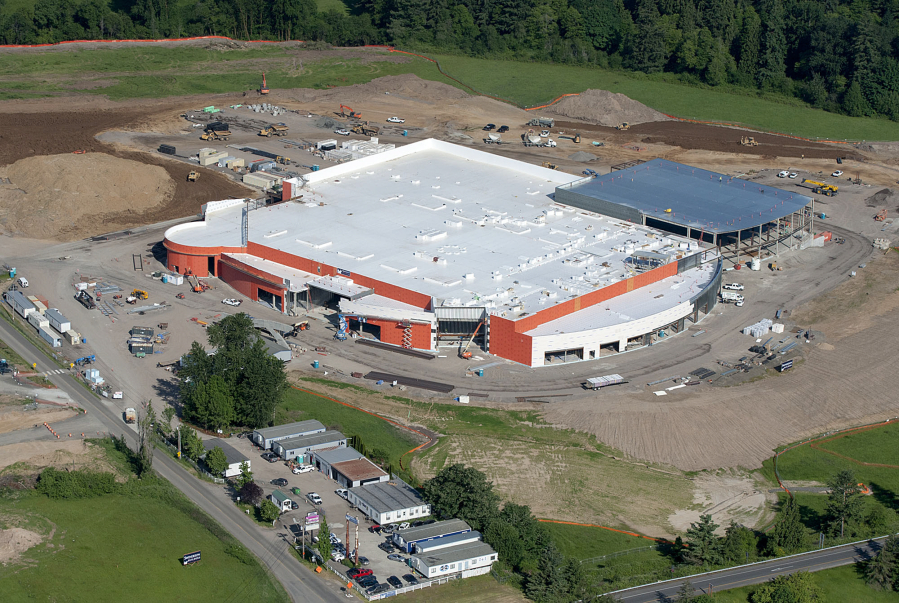Perhaps signaling a solution to one of the most vexing problems surrounding the $510 million Cowlitz casino, Clark County’s public health officer is recommending the county allow the tribe to connect to La Center’s city sewer system.
Forced to find its own solution, the tribe has been working on a system that would inject treated wastewater into the ground above the aquifer that supplies Clark County’s drinking water.
Hooking up the casino to the city sewer line is “the safest thing to do” and a public health necessity, Dr. Alan Melnick said.
La Center’s city sewer system is the safer option because it’s monitored locally and the county has access to data about the wastewater, he said in an interview this week. If something were to go wrong at the city wastewater treatment plant, the discharge would end up in the surface water of the East Fork Lewis River and eventually be washed out, Melnick said. By contrast, it’s not easy to remove contamination from the ground, he said.
“God forbid something went wrong with the injection system and we’re not monitoring it,” Melnick said.
However, neither the county nor the state would have the authority to monitor the effluent from the tribe’s wastewater injection system.
Clark County council Chairman Marc Boldt asked Melnick a month ago to weigh in on the injection well project. Melnick will formally give his recommendation at a 10:30 a.m. meeting Wednesday at the Public Service Center, 1300 Franklin St.
The courts ruled last year that extending a sewer line beyond La Center’s urban growth boundary to the casino, which is under construction west of Interstate 5 at Exit 16, would violate Clark County’s planning policies.
But a state law that addresses urban growth areas offers an exception to the rule in paragraph four of RCW 36.70A.110: “In general, it is not appropriate that urban governmental services be extended to or expanded in rural areas except in those limited circumstances shown to be necessary to protect basic health and safety and the environment.”
That means the county Board of Health, which is comprised of the five county councilors, could declare an emergency and allow the sewer hookup, said Boldt, who was unsure whether the move required the governor’s approval.
Despite its sudden change of heart about the sewer connection, the county, which is embroiled in legal battles with the Cowlitz Tribe, remains opposed to the casino project, Boldt said.
When asked Thursday why county officials didn’t ask for a recommendation sooner, Boldt replied, “Really, we should have probably done it before. … I do realize this is probably at the 11th hour.”
Construction of the wastewater injection wells, which are expected to cost nearly $15 million, are already 35 percent complete, according to the tribe.
Tribe’s reaction
Thursday, Cowlitz Tribe Chairman Bill Iyall issued a statement saying that “there’s no question” the tribe would have preferred to connect to the city’s sewer system when the project was in the design phase. However, Clark County and owners of La Center’s cardrooms went to court and repeatedly blocked the tribe. The Growth Management Board twice turned down La Center’s request to allow the casino to connect to its sewer system, and the city received “a very clear negative ruling” from state Superior Court, Iyall said.
“At this phase of the project, a change in direction would become a decision for the Cowlitz Tribal Council’s Development Board,” he said.
The proposed injection well system is designed to pump up to 400,000 gallons a day of wastewater treated to drinking water standards deep underground. The federal Environmental Protection Agency approved the project, which is similar to those used successfully in other places around the state.
The injection wells are controversial because the Troutdale Aquifer System, which supplies 99 percent of Clark County’s drinking water, lies roughly 120 to 220 feet below the injection site. The tribe, however, has promised to ensure the discharged water meets or exceeds all local, state and federal standards as required by the Safe Drinking Water Act.
Melnick said one of his concerns is that drinking water standards don’t address things such as personal care products, which could be injected underground. His fears are shared by U.S. Rep. Jaime Herrera Beutler, R-Camas, who sent a letter to the EPA in January expressing “deep concerns” about “what could be a serious potential threat” to Clark County’s water supply. She questioned whether the tribe’s wastewater treatment system would be adequate to treat pollutants such as endocrine-disrupting chemicals, nitrates and disinfection by-products.
According to the tribe, the injection wells would discharge water that has undergone an advanced treatment process that uses screening, nitrogen removal, biological waste removal, membrane bioreactor technology, microfiltration and dual disinfection.
“This system is more advanced than secondary treatment plants used by municipalities in the state, and removes more than twice the amount of pharmaceuticals and personal care products and endocrine disrupting chemicals,” Iyall said in a prepared statement.
The tribe is holding a public information session on the system June 30 at the La Center Community Center, 1000 E. Fourth St., La Center. The two identical sessions will be from 5 to 6:30 p.m and from 7 to 8:30 p.m.
If the tribe obtains permission to use La Center’s sewer system, the infrastructure will be in place soon. In February, the tribe agreed to pay for a $3 million sewer line running from downtown to the east side of Interstate 5’s Exit 16 interchange. The line, which is expected to be installed this fall, will serve commercial development that’s expected to arise near the casino. La Center has already expanded its sewage treatment plant.
Thursday, La Center Public Works Director Jeff Sarvis said the city sewer system has the capacity to handle the casino’s wastewater, and that the city would still entertain the tribe’s request for a connection. La Center’s wastewater treatment plant serves a population of 3,050, or 1,300 equivalent residential units.
“We’ve always thought a large customer was good for the utility,” Sarvis said. “It would certainly help stabilize rates. … Anyone I’ve talked to in the county has always thought that La Center’s the better solution. It’s existing, it’s permitted … and it helps the community, too, frankly.”




